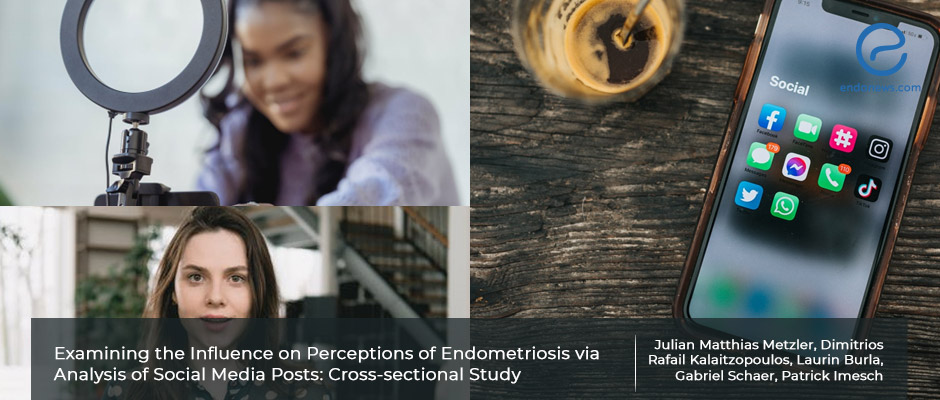Endometriosis information coming from the social media
May 9, 2022
Hot topic: being an influencer for endometriosis
Key Points
Highlights:
- Patients with endometriosis use social media platforms of both hospitals and influencers to get information about endometriosis.
Importance:
- In the evaluating world also the information search has driven its way towards social media including the search for help, communication, and support for endometriosis.
What's done here:
- The authors made a search on Facebook and Instagram using the words “endo” and “endometriosis” to reach out to the social media accounts using those names in a 2-day period in August.
- The accounts with 5000 or more followers or likes in the English language were evaluated.
- The recent 10 posts have been analyzed by 2 individuals in terms of shares, likes, comments, contents, and additional metrics such as “engagement,” an integrative score including reactions, comments, shares, and likes.
- The contents have been divided into groups named “inspiration and support”, “education and research,” “awareness and outreach,” “nutrition, food, and diet,” “sport and lifestyle,” “inspiration and support,” and “personal story,” “patient requests,” “scientific inquiries,” “humor,” and “promotion of product or service.”
Key Results:
- 39 Facebook and 43 Instagram accounts were included, with around 1.4 million followers.
- Hospitals and medical centers were 15% (6/39) of the Facebook pages and 5% (2/43) of the Instagram accounts.
- 820 posts have been analyzed and on the categorization of the topics, Facebook revealed mostly “awareness” posts (25.9% of posts) while Instagram posts were mostly about “inspiration and support” (27.9% of posts) followed by again “awareness” (16.7%), and “personal story” (16.7%).
- When it comes to likes and engagements from followers, the highest percentage of users engaged with posts categorized as “humor” (mean 4.19%, SD 4.53%), “personal story” (mean 3.02%, SD 4.95%), and “inspiration and support” (mean 2.83%, SD 3.08%).
- Posts made by hospitals and medical centers generated higher engagement scores than posts by regular accounts on Facebook (mean 1.44% vs 0.88% of followers per post) and Instagram (mean 3.33% vs 3.19% of followers per post).
Limitations:
- The study shows a quick snapshot of social media platforms on a 2 days-based analysis which narrows the possibility of the prediction about the platforms as all are changing dynamically from moment to moment.
Lay Summary
Today’s changing and evaluating world led everything to be lived online. For sure endometriosis and searching for cures or support for endometriosis have been transferred to online social media platforms too.
The study conducted by Julian Matthias Metzler et al analyzed a 2-day snapshot view of Instagram and Facebook posts about endometriosis. The authors made a search on Facebook and Instagram using the words “endo” and “endometriosis” to reach out to the social media accounts using those names in a 2-day period in August in order to put an appropriate time distance from march endometriosis awareness month.
The accounts with 5000 or more followers or likes and which are in the English language were counted in. Accounts that are not open to the public or inactive or have less than 10 posts have been excluded. The recent 10 posts have been analyzed by 2 individuals in terms of shares, likes, comments, contents, and additional metrics such as “engagement,” an integrative score including reactions, comments, shares, and likes.
The contents have been divided into groups named “inspiration and support”, “education and research,” “awareness and outreach,” “nutrition, food, and diet,” “sport and lifestyle,” “inspiration and support,” and “personal story,” “patient requests,” “scientific inquiries,” “humor,” and “promotion of product or service.” 39 Facebook and 43 Instagram accounts were included, with around 1.4 million followers.
Hospitals and medical centers were 15% (6/39) of the Facebook pages and 5% (2/43) of the Instagram accounts. 820 posts have been analyzed and on the categorization of the topics, Facebook revealed mostly “awareness” posts (25.9% of posts) while Instagram posts were mostly about “inspiration and support” (27.9% of posts) followed by again “awareness” (16.7%), and “personal story” (16.7%).
When it comes to likes and engagements from followers, the highest percentage of users engaged with posts categorized as “humor” (mean 4.19%, SD 4.53%), “personal story” (mean 3.02%, SD 4.95%), and “inspiration and support” (mean 2.83%, SD 3.08%). Posts made by hospitals and medical centers generated higher engagement scores than posts by regular accounts on Facebook and Instagram.
The study published in JMIR Formative Research revealed that "Social media is something that could not be outlined in our lives, thus, both health care providers and advocates on social platforms should act knowing this reality.
Research Source: https://pubmed.ncbi.nlm.nih.gov/35302501/
social media posts endometriosis

